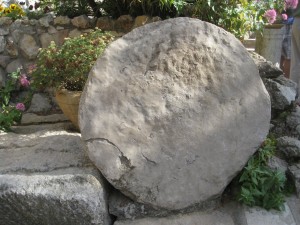By S. Kent Brown. This is an extract from The Testimony of Luke. For this reading, compare Matt. 27:37–43; Mark 15:26–32; John 19:19–27.
New Rendition
34 And Jesus said, “Father, forgive them, for they do not know what they do.” And dividing his garments, they cast lots. 35 And the people stood watching. And also the leaders kept sneering, saying, “Others he saved. Let him save himself, if he is the Christ, the chosen one of God.” 36 And the solders coming to him, ridiculed him, bringing vinegar to him, 37 and saying, “If you are the King of the Jews, save yourself.” 38 And there was also a writing above him, “This is the King of the Jews.”
Analysis
The Joseph Smith Translation’s stunning addition to the Savior’s plea for forgiveness in 23:34, which forms the heart of these verses because of the abuse that he receives—“Meaning the soldiers who crucified him” ( JST 23:35)—pushes forward the issue whether certain wicked acts can be forgiven. To be sure, some cannot, such as blasphemy against the Holy Ghost (see 12:10; D&C 132:27). But what about other serious sins? Are there limits to divine mercy? Are there bounds to celestial clemency? In response, we notice that, in the only existing sample of the Savior’s intercessional language in modern scripture, he limits his appeal to his Father, seeking the Father’s graciousness only for those who “believe on my name,” begging him to “spare these . . . that they may . . . have everlasting life” (D&C 45:5). This engaging framework fits snugly with other passages from latter- day scripture that set out a limit to salvation—only for those who believe and repent (see 2 Ne. 2:6–7; Mosiah 3:17–19; Alma 12:15; D&C 29:43–44; etc.). Why? Because saving the wicked, particularly those who “have willfully rebelled against God . . . and would not keep [the commandments of God]” cuts across God’s justice: “salvation cometh to none such; for the Lord hath redeemed none such; yea, neither can the Lord redeem such” (Mosiah 15:26–27). Continue reading


